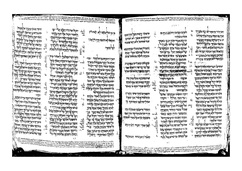Textual witnesses
Some early manuscripts containing the text of this chapter in Hebrew are of the Masoretic Text tradition, which includes the Codex Cairensis (895), the Petersburg Codex of the Prophets (916), Aleppo Codex (10th century), Codex Leningradensis (1008). Some fragments containing parts of this chapter were found among the Dead Sea Scrolls, i.e., 4QJerc (4Q72; 1st century BC), [3] with extant verses 4:5(‑6), 13‑16 (similar to Masoretic Text). [4] [5] [6]
There is also a translation into Koine Greek known as the Septuagint, made in the last few centuries BCE. Extant ancient manuscripts of the Septuagint version include Codex Vaticanus (B;  B; 4th century), Codex Sinaiticus (S; BHK:
B; 4th century), Codex Sinaiticus (S; BHK:  S; 4th century), Codex Alexandrinus (A;
S; 4th century), Codex Alexandrinus (A;  A; 5th century) and Codex Marchalianus (Q;
A; 5th century) and Codex Marchalianus (Q;  Q; 6th century). Among the Chester Beatty Papyri (BHK:
Q; 6th century). Among the Chester Beatty Papyri (BHK:  Beatty) are the fragments of Jeremiah (Rahlfs 966; Chester Beatty Library (CBL) BP VIII), dated from the late second century or early third century AD, containing Jeremiah 4:30–5:1; 5:9–13; 5:13–14; 5:23–24. [8]
Beatty) are the fragments of Jeremiah (Rahlfs 966; Chester Beatty Library (CBL) BP VIII), dated from the late second century or early third century AD, containing Jeremiah 4:30–5:1; 5:9–13; 5:13–14; 5:23–24. [8]

